In the pipeline: The perks and pitfalls of life as a modern NHL official
The 2019 NHL playoffs were every official's nightmare - a horror show stuck on repeat.
On top of the usual debates over goalie interference and borderline hits, this past spring featured an abundance of officiating controversies. Everybody was frustrated.
There was the phantom major penalty in the opening round, the protective netting and bench-door offside fiascos in Round 2, the missed hand pass in the conference finals, and finally - the big kahuna - the missed tripping call in Game 5 of the Stanley Cup Final.
NHL commissioner Gary Bettman tried to keep his head from exploding. Perplexed players and coaches called the blunders "embarrassing" and a "black eye" on the league. ESPN proclaimed that officiating in the postseason was "maddeningly inconsistent." The Hockey News argued that referees had hijacked an otherwise entertaining Cup Final.
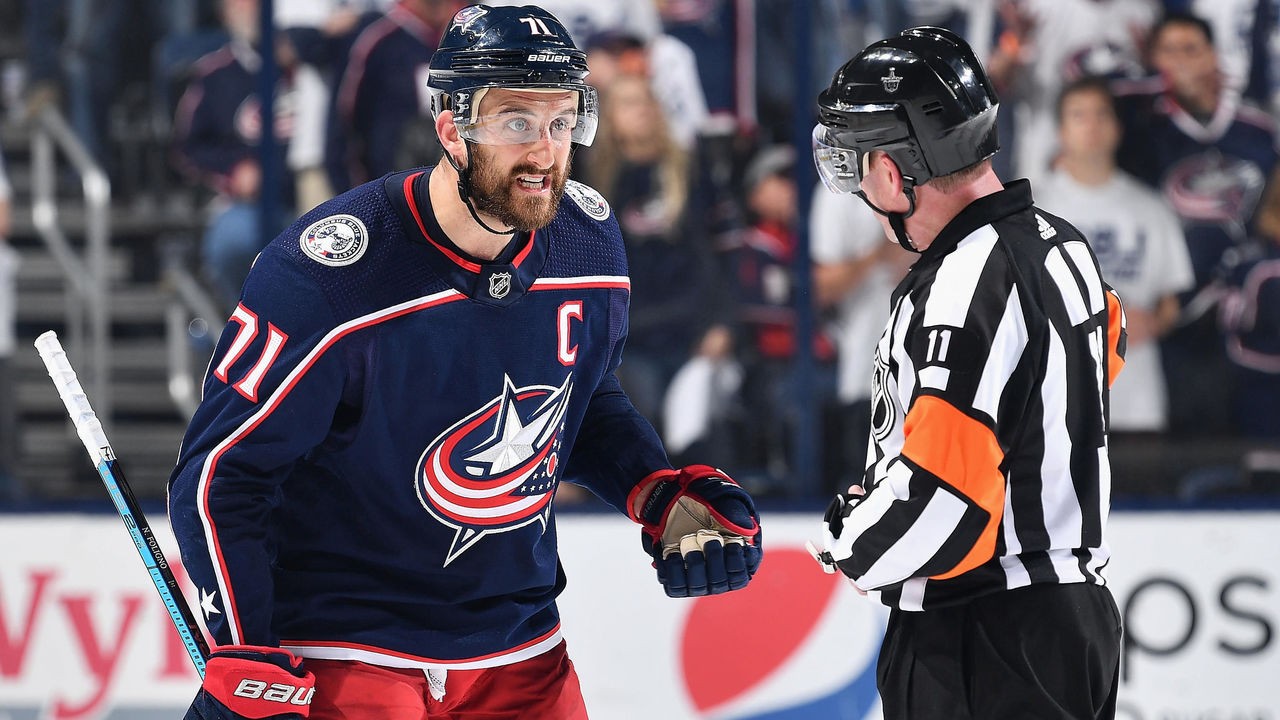
Everything that could go wrong went wrong, and the referees and linesmen shouldered the bulk of the blame. After the dust settled, one question kept percolating in my brain: Why, in this era, would somebody aspire to be an NHL official?
Officials are expected to be mistake-free, and when they aren't, they get booed mercilessly, chastised on social media, and picked apart behind closed doors.
Meanwhile, their influence on the game is eroding thanks to advancements in technology and the quest for perfection. They're constantly away from family, traveling upwards of 175 days a year to fulfill a dizzying schedule. Nobody, aside from their loved ones and those at ice level, gives a crap when an errant stick wounds them in the crotch or the mouth.
From afar, it's fair to suggest the cons of the profession definitely outweigh the pros. There are so many other careers to pursue. Why officiate?
The new path
On a sunny day in August in Western New York, the NHL staged its annual Officiating Exposure Combine at the Harborcenter, the same college hockey rink where the league holds its pre-draft scouting combine for players every April. The invitation-only event is mainly targeted at former players who are interested in a second career in hockey, making it both a semi-competitive tryout and an experimental leap of faith.
"Growing up, none of the people here wanted to be officials," NHL director of officiating Stephen Walkom said from his seat overlooking the ice. "They wanted to be players. Then they tried officiating - like some are today - and they fell in love with it."
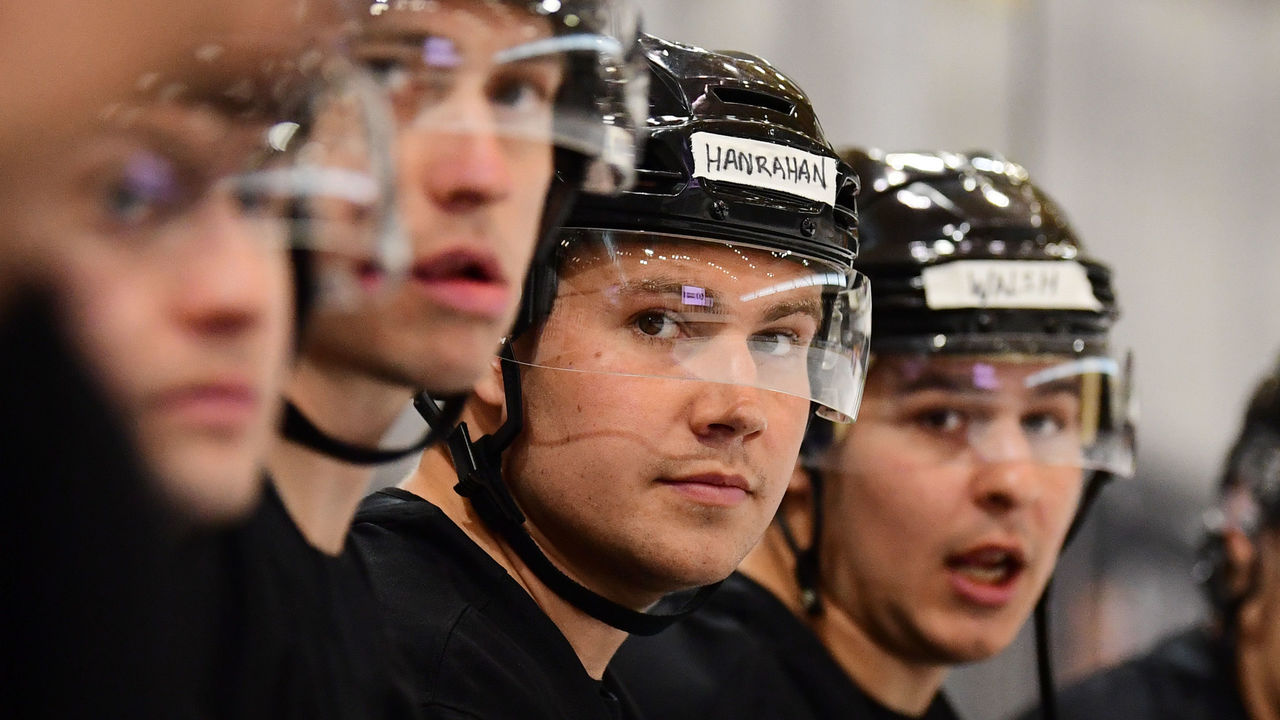
The combine is a four-day crash course. On-ice instructors teach the fundamentals of calling a game, such as signaling an infraction, running a faceoff, and positioning. Off the ice, attendees move through various tests for fitness, vision, and decision-making. They learn about theory and social media. If you happen to be on the fence about seriously pursuing officiating, you'll either love it or hate it by the time you leave the combine.
It's clear after an hour or two of observation and conversation that the NHL covets a particular handful of core traits in prospective officials: great communication skills, a strong understanding of the rulebook, fluent and agile skating abilities, elite hockey sense, and certainly a thick skin.
Occasionally, a first-timer checks off all the boxes. "When you scout refs, you see a Sidney Crosby or a Connor McDavid," Al Kimmel, the NHL's top evaluator of officials, said. "Those people stand out from everybody else."
Walkom and Kimmel can identify a future star referee without having seen them call a meaningful game at any level. The ex-pro bypasses the traditional learning curve. "If you’ve been on the third or fourth line and sat on the bench a lot," Walkom explained, "you've been calling penalties, offsides, and icings for a long time."
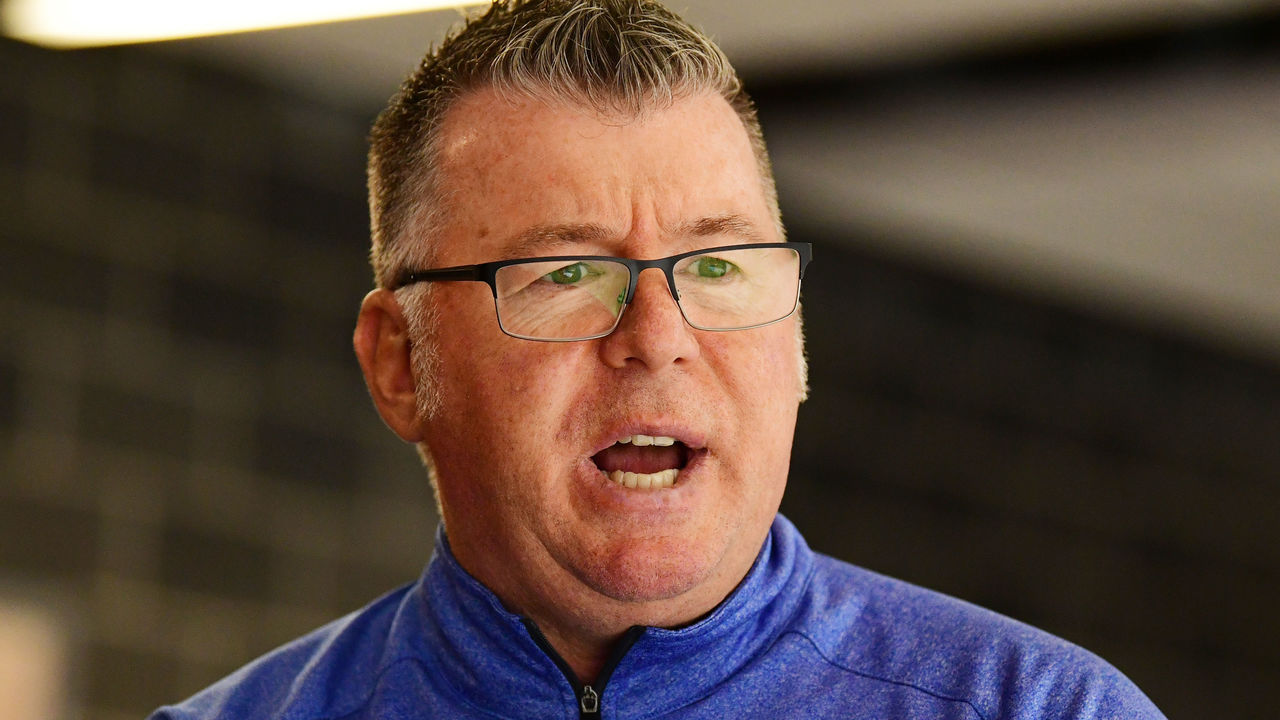
Kyle Flemington, a former enforcer who retired from pro hockey in 2017 following a combined 152 games in the ECHL and the top league in the UK, has been on a fast track since his appearance at the 2018 combine. The 27-year-old will split the 2019-20 season between the NHL and AHL after just one year of officiating in the AHL and OHL.
Flemington, who's on the linesman track, is 6-foot-7, strong as an ox, skates well, and has shown he can develop a strong rapport with all kinds of players. He owns a diploma in police foundations but decided to give officiating a whirl - and is now hooked.
"You're there to help the game of hockey," Flemington said. "You're not there to try to screw it up. I think that's a misconception when people think of officials. We're not there to be the bad guy. We're there to run the game in a safe manner, and conduct it at a good pace."
There's also financial incentive to join the profession. Under the latest collective bargaining agreement between the league and its officials, NHL referees earn between $190,000 and $400,000 per year, while NHL linesmen pull in between $125,000 and $250,000. That's a significant pay bump for a former ECHL player.
Currently, 34 referees and 34 linesmen are on staff to exclusively work NHL games. Another 10 refs and four linesmen - up-and-comers such as Flemington - rotate between NHL and AHL assignments. In addition, Walkom said, the league monitors 20 to 25 prospects who call games at lower levels, like the ECHL and juniors, to keep the officiating pipeline fresh. In total, about 100 individuals are in the NHL system.
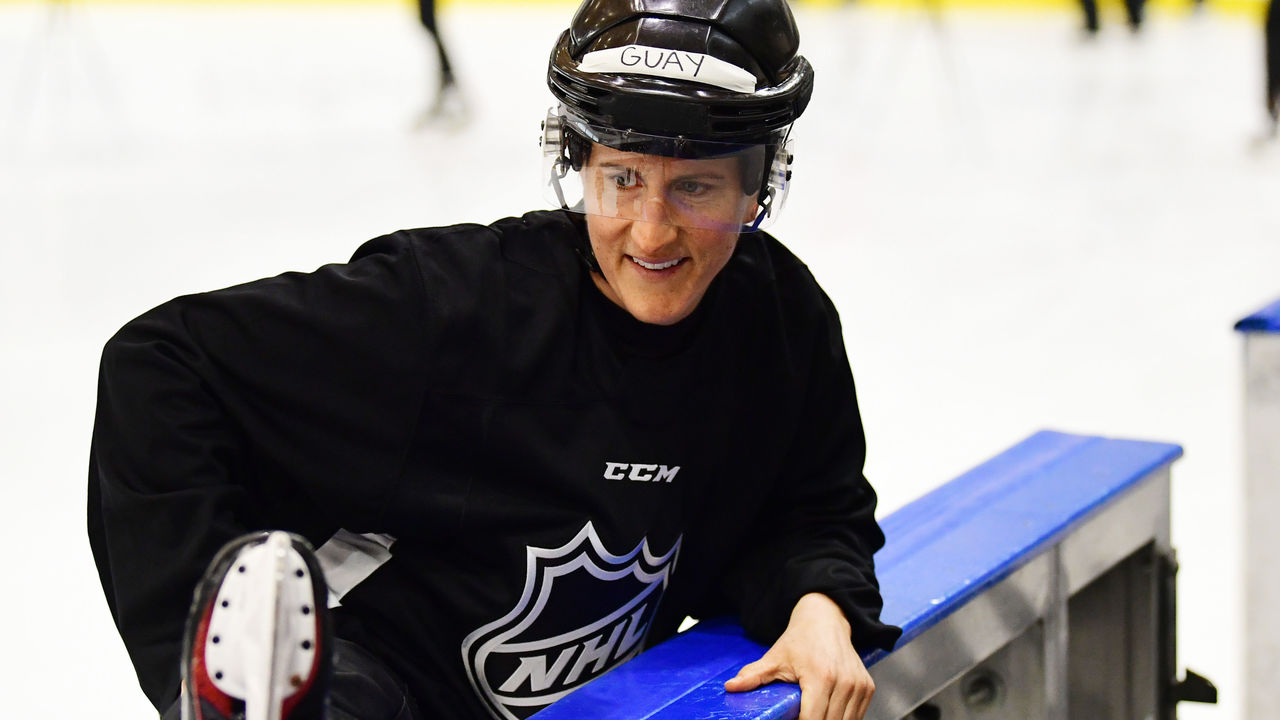
Four of them are women: referees Katie Guay and Kelly Cooke, as well as Kirsten Welsh and Kendall Hanley, who work the lines. All four attended the Buffalo combine, and they officiated NHL prospects at rookie tournaments earlier this month.
Guay, who played college hockey at Brown and now officiates men's Division I games, is on a trajectory that should one day land her a permanent NHL gig. She's a woman in a male-dominated field but reports no cases of mistreatment from NCAA players, coaches, or officials, which has liberated her to climb the ranks.
"Our goal as officials is like the players: to make it to that big game," Guay said. "We have great camaraderie in the locker room. It's fun to be with the crews and work together. We're the third team on the ice and, ultimately, we're just out there to have fun, service the game, and play our role."
And speaking generally, Walkom says, "It's just a matter of time" before the NHL follows the NBA and NFL by hiring its first full-time female official.
Lifestyle and flak
On game night, the average NHL fan is introduced to the officials when the broadcast flashes the crew's names and their faces before puck drop. Unless the final score is linked to a call, the striped skaters fade from our memories shortly after the last horn sounds.
Save for a handful who've hit the mainstream - the exuberant Wes McCauley, the polarizing Tim Peel, and pro golfer Garrett Rank top the list - most NHL officials are anonymous. The game is built on the players, not those who enforce the rulebook, but the anonymity leaves room for a lack of empathy from outsiders for the trials of the job.
"Fans see you on the screen for two hours and they don't see what happens before or after that," Tyson Baker, a 24-year-old linesman working in the NHL and AHL, said. "Maybe you had a flight delay and you're stuck in an airport for eight hours. Maybe you've got to hustle home after a trip because you have another plane to catch."
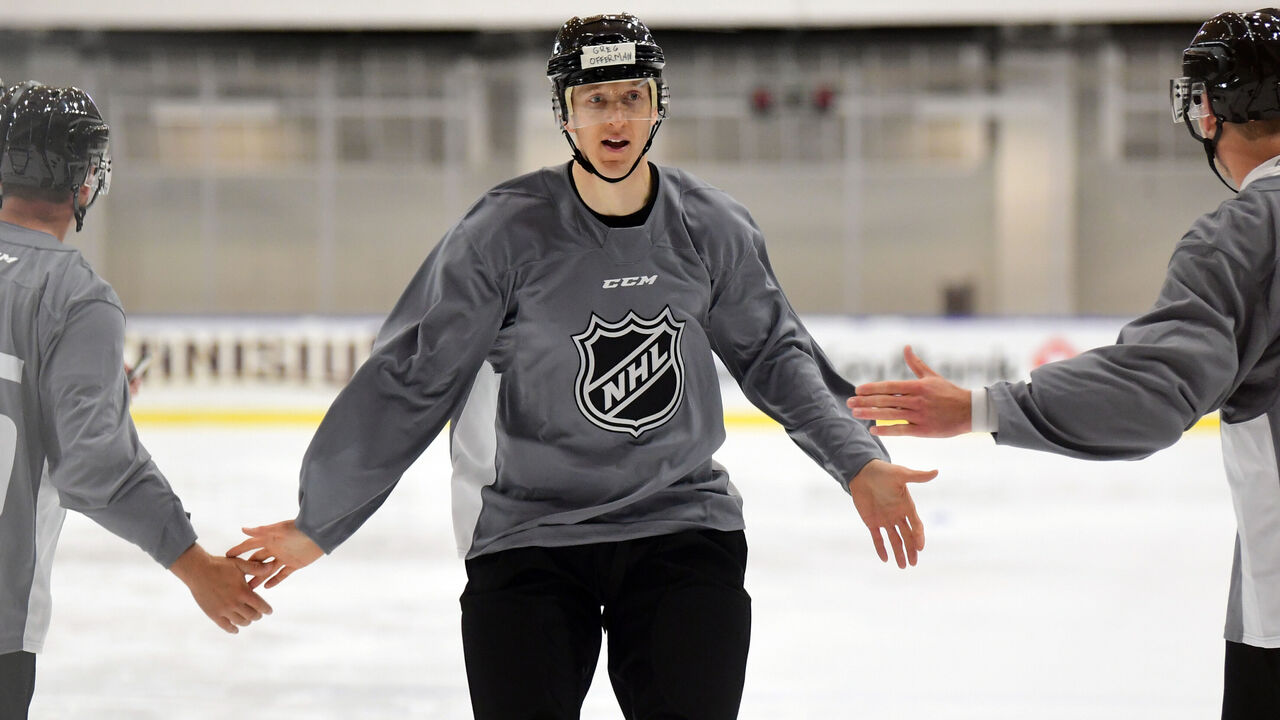
NHL officials fly commercial, often alone, covering 180,000 to 200,000 miles per season. A typical week features three games, usually in different cities. By year's end, officials who advance through the postseason will have slept in hotel beds about as often as they've slept at home. Road duties include doing your own laundry, eating healthy, working out, and studying the next game's players and coaches.
"You have to be dialed in for 60 minutes every night," Flemington replied when asked about the main takeaway from his first year of officiating. "You're the one running the game. You're blowing the whistle. The game stops when you want it to stop."
Booing is a peculiarity of the job that each newcomer must come to grips with in a hurry. Being loathed by a large group of people - 20,000 or so in a packed NHL arena - is a unique and lonely experience. Most people can't relate. The zen move is to disregard the noise, no matter how intimidating it may be. After all, it's out of your control.
"You have to laugh it off," NHL referee Corey Syvret said. "The fans are passionate; we're passionate. Everybody's out there trying to (call a solid game). You're never going to please everybody, so it's really something you have to embrace."
You may have noticed that NHL officials don't have social media accounts. In an effort to diminish the wrath of overzealous fans, the league has a line in its contracts with officials that bans the use of platforms such as Twitter, Facebook, and Instagram.
Syvret says NHL players, coaches, and executives respect the roles of referees and linesmen on the whole. It's impossible to avoid confrontation altogether - especially when emotions run hot after a missed, borderline, or incorrect call - but there's a blanket awareness that officials are human and humans make mistakes.
"Everyone is striving for perfection," said Syvret, a former defenseman who's viewed as a rising star in officiating circles. "I don't believe that'll ever happen in this business. It's so competitive, there's so much emotion and intensity out there. Things happen so fast."
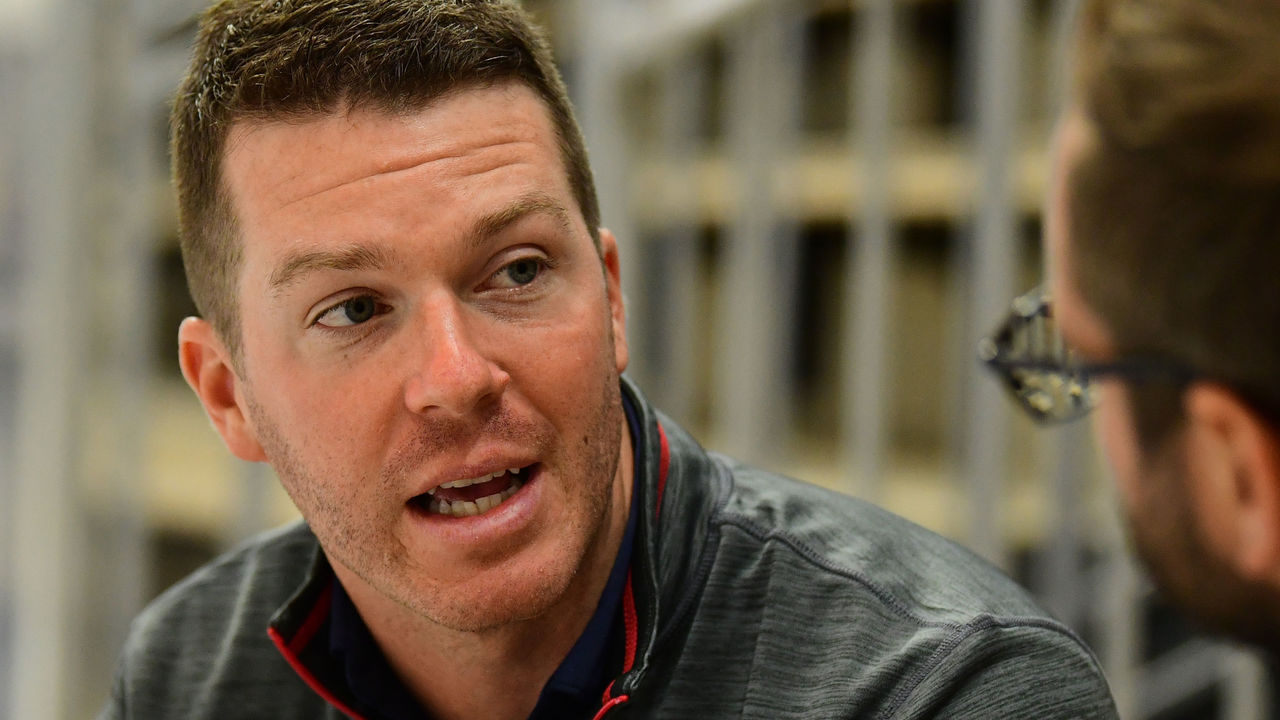
However, the further a game is removed from the NHL, the more abuse players, coaches, and spectators seem to direct toward officials. Minor hockey - and youth sports in general - can be a cesspool for attacks that are mostly verbal but sometimes physical. USA Hockey loses 50% of its 9,000 new officials after their first year, in part because of the constant harassment they face.
"Society today tends to be a little bit different than it was 30 years ago," USA Hockey director of officiating Matt Leaf said by phone from the organization's headquarters in Colorado. "There's an expectation that officials - regardless of age, regardless of experience level, regardless of what level of hockey they're out there working - (should) be perfect and only get better from there. That's just not a realistic approach."
Leaf added: "Nobody's banging on the glass screaming at Little Johnny for missing the open net, right? Yet, if the official missed an offside, it's like the end of the world."
Future of officiating
As noted, the abilities of NHL officials were called into question far too often in the 2019 playoffs. Mistakes became a cringeworthy story on several occasions.
"Nobody wants to have that kind of effect on a hockey game, and we had some of our best guys on the ice," Walkom said. "Mistakes happen. Our job as officials is to recover. Last postseason wasn't easy. A lot of unfortunate incidents affected results. And, our team collectively, we know we need to be better. That's life, and we'll learn from it."
The league's Board of Governors and its general managers rallied to implement a series of rule changes for the 2019-20 campaign. Among them is an expansion of the video review and coach's challenge systems. This season, officials will be able to review certain penalty calls on video, while coaches can challenge missed stoppages of play in the offensive zone.
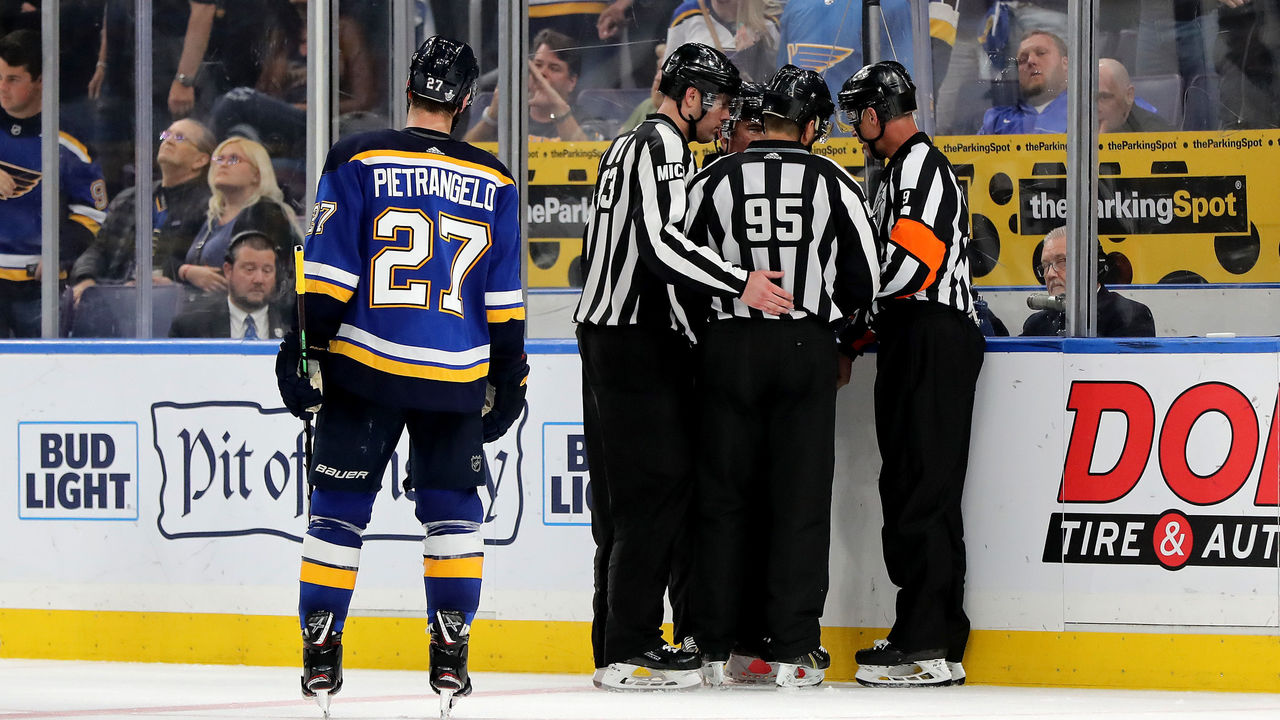
It remains to be seen if these alterations will make a sizable impact or just slow down the game. Either way, Walkom insists, the officials are on board and undeterred. "People think that officials are very anti-technology, that it's taking away their power," he said, "but if any official is in it for the power, they're in it for the wrong reasons."
"We'd ultimately like to do it on our own, in real time," Syvret said. "But sometimes you're blocked out and you don't see the whole play. Was the puck kicked in on the far side of the net? There's freaky things that happen, and that's when it become useful."
The NHL has been criticized in the past for not being as forthcoming as it could be with explanations and accountability regarding specific judgment calls made by officials. Videos prepared by the league's hockey operations department that explain rules and calls are released to the public, but the officials themselves never speak to the media. The league, a spokesperson says, is not considering a change in that stance.
So, why officiate? Well, there's the thrill of being in the thick of it, the healthy paycheck, the camaraderie, and the opportunity to push yourself. Players score and make saves; officials try their darndest to call a good game.
"There's excitement in being right down there in the action, feeling the breeze on your face, being in the middle of scrums," Kimmel said.
"Even that intensity of making a correct decision in the moment - in a split second - it's just challenging yourself to be the best that you can be. Athletes, in whatever sport and whatever angle they pursue, they want to be the best."
John Matisz is theScore's national hockey writer.